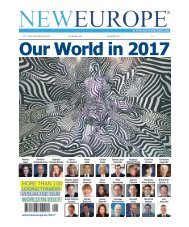Our World in 2018
Leading minds reflect on the state of our societies, and examine the challenges that lie ahead. An edition dedicated to generating ideas that will help form a new vision for our world.
Leading minds reflect on the state of our societies, and examine the challenges that lie ahead. An edition dedicated to generating ideas that will help form a new vision for our world.
You also want an ePaper? Increase the reach of your titles
YUMPU automatically turns print PDFs into web optimized ePapers that Google loves.
SCIENCE & TECHNOLOGY
an in-depth look at computational propaganda in nine
countries – Brazil, Canada, China, Germany, Poland, Russia,
Taiwan, Ukraine, and the United States – and a comparative
look at 28 others. We have also analyzed the spread of
elections during the last year (and in the past, we have
studied Mexico and Venezuela). Globally, the evidence
doesn’t bode well for democratic institutions.
a significant role in political engagement. Indeed, they
are the primary vehicle by which young people develop
their political identities. In the world’s democracies, the
majority of voters use social media to share political news
and information, especially during elections. In countries
where only small proportions of the public have regular
access to social media, such platforms are still fundamental
infrastructure for political conversation among journalists,
civil-society leaders, and political elites.
Moreover, social media platforms are actively used to
manipulate public opinion, though in diverse ways and on
.I
platforms are one of the primary means of preventing
popular unrest, especially true during political and security
crises.
Almost half of the political conversation over
Russian Twitter, for example, is mediated by highly
automated accounts. The biggest collections of
and Ukraine.
A
are actively used for computational propaganda, either
experiments on particular segments of the public. In Brazil,
R
her impeachment in early 2017, and amid the country’s
ongoing constitutional crisis. In every country, we found
civil-society groups struggling to protect themselves and
respond to active misinformation campaigns.
Facebook says that it will work to combat these
information operations, and it has taken some positive
steps. It has started to examine how foreign governments
use its platform to manipulate voters in democracies.
Before the French presidential election last spring, it
removed some 30,000 fake accounts. It purged thousands
more ahead of the British election in June, and then tens of
thousands before last month’s German election.
F
fundamental shift from defensive and reactive platform
tweaks to more proactive and imaginative ways of
A close-up image showing the Facebook app on an iPhone
in Kaarst, Germany, 08 November 2017 (reissued 31 January
2018). EPA-EFE/SASCHA STEINBACH
supporting democratic cultures. With more critical political
moments coming in 2018 – Egypt, Brazil, and Mexico will
all hold general elections, and strategists in the US are
already planning for the midterm congressional election
in November – such action is urgent.
Let’s assume that authoritarian governments will
continue to view social media as a tool for political
control. But we should also assume that encouraging
civic engagement, fostering electoral participation, and
promoting news and information from reputable outlets are
crucial to democracy. Ultimately, designing for democracy,
in systematic ways, would vindicate the original promise
of social media.
Unfortunately, social media companies tend to blame
their own user communities for what has gone wrong.
Facebook still declines to collaborate with researchers
seeking to understand the impact of social media on
democracy, and to defer responsibility for fact-checking
the content it disseminates.
Social media firms may not be creating this nasty
content, but they provide the platforms that have allowed
computational propaganda to become one of the most
powerful tools currently being used to undermine
democracy. If democracy is to survive, today’s social media
giants will have to redesign themselves.
OUR WORLD | 2018
Copyright: Project Syndicate, 2018. www.project-syndicate.org
81










